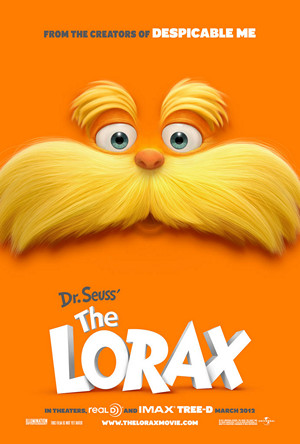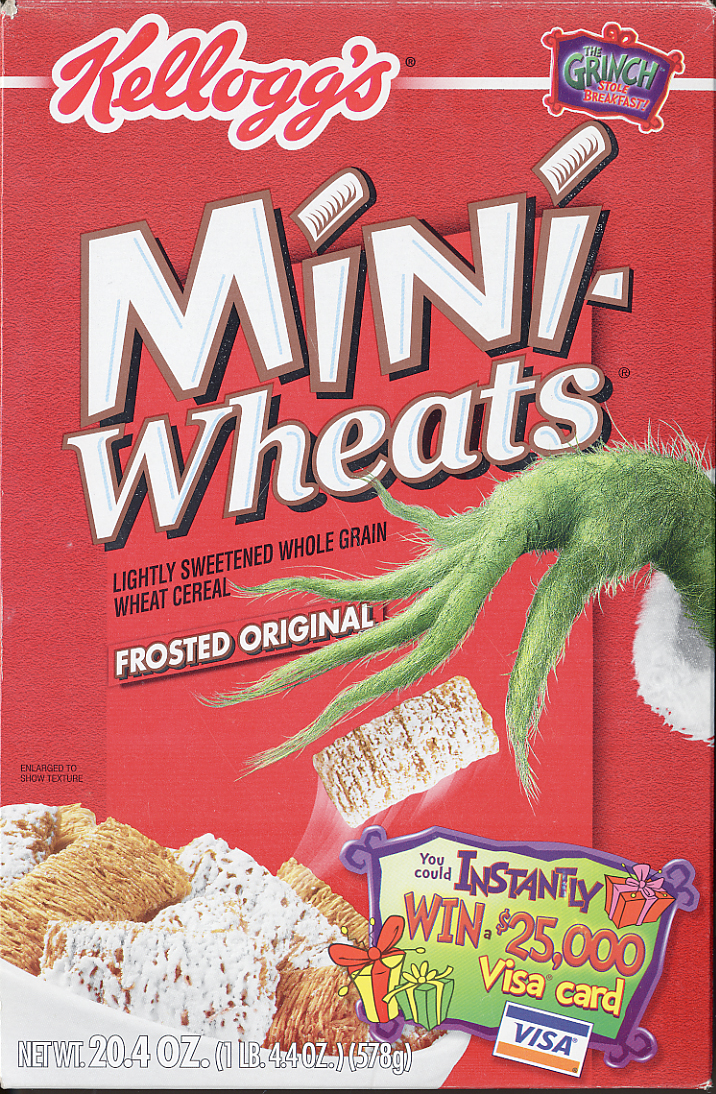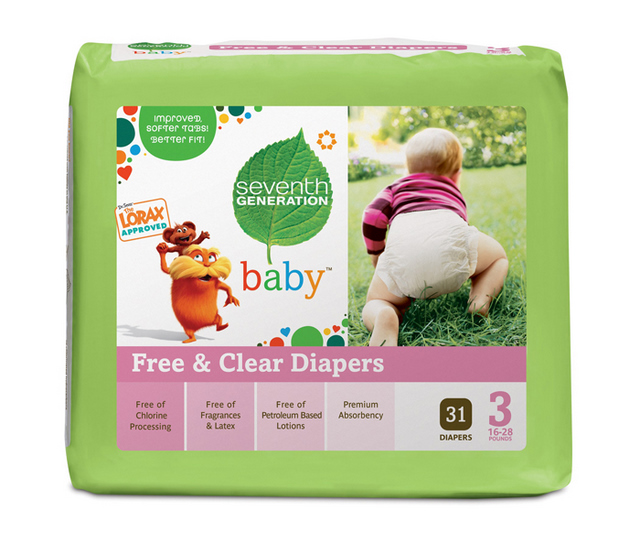 The commercials for The Lorax film say:
The commercials for The Lorax film say:
I am the Lorax. I speak for the tweens.1
The commercials for the many Lorax tie-ins say:
I am the Lorax. I speak for the SUVs.2
I am the Lorax. I speak for the pancakes.3
I am the Lorax. I speak for the diapers.4
But what does the film itself say? In its own way, Illumination Entertainment’s film adaptation actually does speak for the trees. Sure, having the film’s male lead (Ted, voiced by Zac Efron) drive a gigantic motor-scooter isn’t exactly environmentally friendly. Why not give him a bicycle, or, better, the Seussian equivalent of a bicycle? That said, the kid only gets his ecological consciousness raised near the end of the film. So, perhaps having him buck social convention prior to the awakening of his conscience would have been less plausible for his character.
In any case, he does get the message. Initially, he seeks a Truffula seed solely to impress the girl he has a crush on –Â Audrey, voiced by Taylor Swift. (She’s named for Geisel’s widow, and he’s named for Theodor Seuss Geisel himself.) However, by film’s end, the Once-ler has convinced Ted of the Lorax’s message. In one of the movie’s final scenes, Ted, defending his goal of planting the last Truffula seed in the town square, announces, “I’m Ted Wiggins. And I speak for the trees!” Indeed, the movie manages to work the book’s central message in twice:
UNLESS someone like you
cares a whole awful lot,
nothing is going to get better.
It’s not.
Realizing what the “UNLESS” left by the Lorax must mean, The Once-ler delivers this line, just as he does in the book. Later, just before the credits roll, the filmmakers put the full quotation up on the screen:
UNLESS someone like you
cares a whole awful lot,
nothing is going to get better.
It’s not.
– Dr. Seuss
In The Lorax’s film adaptation, the book’s environmental message comes through loud and clear.
It also amplifies the book’s depiction of capitalism as amoral. In the “How Bad Can I Be?” number, the Once-ler (in the narrative of his past) sings about the “biggering and biggering” of his business: “My conscience is clear. I’ve done nothing illegal. I have my rights.” Just after he sings, “nothing is going to stop me,” the Super-Axe-Hacker cuts down the last Truffula tree, and the Lorax (voiced by Danny DeVito) tells him, “That’s it. The very last one. That may stop ya.” This puts the lie to the plaque on the wall of his mansion, glimpsed earlier in the song:
TOO BIG
TO FAIL
The Once-ler.
Aligning the Once-ler’s Thneed business with the mismanaged banking industry, the film reminds us that no one is too big to fail. The Once-ler’s remorse for destroying the trees also indicates that all business decisions are moral ones: what is legal or financially remunerative may not also be moral.
Driving this point home, the film creates a second villain who, unlike the Once-ler, does not develop a conscience during the movie. Voiced by Rob Riggle, O’Hare is the businessman who runs Thneedville, where our protagonist and everyone but the Once-ler lives. He makes his money selling air. Thneedville is a walled-in, completely artificial city: As we learn at the beginning of the film, it’s “a town without nature, not one living tree.” Visually, it looks a little too appealing, like a Seussian amusement park. The grey, desiccated Street of the Lifted Lorax more effectively makes vivid the effects of pollution. However, the film shows us that scene, too. And it exposes O’Hare’s mercenary nature: he doesn’t want a tree in Thneedville because it’s bad for business. Warning Ted to cease venturing outside Thneedville (where the Once-ler lives), he says, “I make a living selling fresh air to people. Trees – they make it for free. So, I see this as a threat to my business.”
As you will have already discerned, yes, the film is didactic. Of course, the book was didactic, too. Both offer entertaining didacticism – brightly colored landscapes, rollicking anapestic verse, and, in the film, more fully developed characters, dance numbers, a lively score by and even a tween crush. Seuss purists may complain: but the book has no dance numbers, no tween crush, no Thneedville, no O’Hare, and the Once-ler does not play the guitar! All of that is true. If you were hoping for a movie that was slavishly faithful to Seuss’s original book, then the film will disappoint.
However, a picture book and a film each have different strengths and weaknesses. An attempt to create a literal rendition of the book would fail,… and would probably be quite short. The question to ask is not: Was the film faithful to the book? No film can be faithful to its original source, and nor should it aspire to be. The question to ask is: How well did the director, writers, actors, animators, etc. translate the experience of the book into the medium of animated film? And: Did their film manage to convey the core experience of the book? In the case of The Lorax, the answer is: Yes.
Indeed, I would go so far as to say that Dr. Seuss himself would like the film –Â or most of it, anyway.
 I doubt Seuss would appreciate seeing his Lorax selling SUVs, diapers, or pancakes, just as I suspect he would have disapproved of the Grinch being used to sell cereal, candy, and soda. The 2000 live-action Grinch film had its title character selling Frosted Mini-Wheats, Hershey’s candies, and Sprite – among many other products. When Seuss’s anti-consumerist grouch (the Grinch) is selling Frosted Flakes or his environmental protector (the Lorax) is selling SUVs, there’s a problem.
I doubt Seuss would appreciate seeing his Lorax selling SUVs, diapers, or pancakes, just as I suspect he would have disapproved of the Grinch being used to sell cereal, candy, and soda. The 2000 live-action Grinch film had its title character selling Frosted Mini-Wheats, Hershey’s candies, and Sprite – among many other products. When Seuss’s anti-consumerist grouch (the Grinch) is selling Frosted Flakes or his environmental protector (the Lorax) is selling SUVs, there’s a problem.
Yes, I recognize that product tie-ins are a standard way to underwrite the astronomical costs of a big-budget film. Furthermore, I’m aware that Seuss was an advertising man himself: until the publication of The Cat in the Hat (1957), he made his living by creating advertisements, not children’s literature. In other words, I’m not trying to represent Seuss as a morally uncomplicated, anti-consumerist figure. He was a commercial success in part because he was able to apply what he learned in advertising to writing and illustrating books for children.
However, you don’t have to be a Seuss scholar to see that the Lorax should be speaking for the trees, not the SUVs. As the book and the film make clear, we really don’t need more Thneeds.
My rating for the film: B+.
My rating for the tie-ins: F.
1. The trailer plays up the romance narrative, which (mercifully) doesn’t figure as prominently in the film. Â Below, the longer version. Â The short ads give the whole love-interest angle even more prominence.
2. In connection with the film, the Lorax is selling the Mazda CX-5 as “Truffula Tree-Certified.” In addition to running on TV, this ad ran in the theatre prior to the start of the film. Oy.
3. As the Horton Hears a Who! film (which I would also recommend) did, The Lorax is selling food of dubious nutritional merit. That is, both are selling food from the International House of Pancakes. At IHoP, you can buy Rooty Tooty Bar-Ba-Looty Blueberry Cone Cakes and Truffula Chip Pancakes.
True, the commercial above indicates that IHoPÂ is also giving away free seeds – which, at least, is something.
4. Seventh Generation is selling diapers bearing the Lorax’s likeness. Â In their defense, they’re trying to make healthier diapers (which is more in line with The Lorax‘s message). Â Of course, they are disposable, which isn’t great for the environment.


Sara Austin